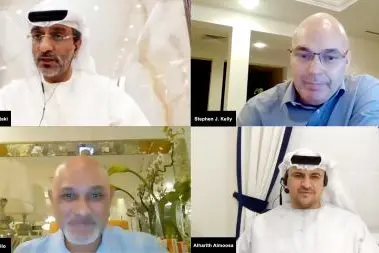PHOTO
The highly acclaimed and popular 'Experts Talk Show' webinar series, which is sponsored and organized by Falconcity of Wonders L.L.C., hosted its fifth webinar episode featuring invited industry experts who shared insights and recommendations related to 'Property Service Charges.’ The latest episode featured leading industry personalities such as Alharith Almoosa, Vice Chairman, Falconcity of Wonders, Jeevan D’Mello, CEO of Zenesis Corp; Stephen J. Kelly, a partner based in Dechert’s Dubai office; and Jassim Al Bastaki, an economic affairs researcher, who moderated the session.
Commenting on this, Alharith Almoosa, Vice Chairman, Falconcity of Wonders, said, "We were very excited about the latest edition of the 'Experts Talk Show' series, which discussed how we are all responsible for keeping communities clean and well maintained. Today, buyers are looking at service charges as an important factor in buying or keeping properties in good shape."
“The episode discussed initiatives that are being undertaken by the concerned authorities to cope with the unprecedented global circumstances and continue supporting this sector. We were also able to shed light on how property service charges match with the current housing market prices,” Almoosa added.
For his part, Jeevan D’Mello said: “What most aspiring homeowners don’t know is that service charges are necessary to ensure the upkeep of properties. It is the cost that is needed to run a building and is not dependent on the price of the property or fluctuations in rents. Therefore, it is each homeowner’s responsibility to contribute to the upkeep and wellbeing of the community.”
Stephen J. Kelly stated: “Service charges cover the cost of running a community including its facilities and are levied based on an annual budget. This means, these charges are payable even if no one uses the facilities as the costs of maintenance and operation of the facilities continue regardless of whether they are being used or not. Applicable service charges for each unit are in accordance with a participation quota or unit entitlement, which means the annual cost is a ratio of the unit’s size to the aggregate of the size of all the units.”
Jassim Al Bastaki concluded: "We are very pleased by the strong response that we have received for the show. The unique appeal and format of the show has ably positioned it as a new thought leadership platform that connects experts with knowledge seekers. Also, very popular is the show's Q and A session, which has led to increased engagement with the audience who share their insights, opinions, views and recommendations."
Now in its fifth edition, previous episodes of the show have generated over 100,000 visitors.
© Press Release 2020
Disclaimer: The contents of this press release was provided from an external third party provider. This website is not responsible for, and does not control, such external content. This content is provided on an “as is” and “as available” basis and has not been edited in any way. Neither this website nor our affiliates guarantee the accuracy of or endorse the views or opinions expressed in this press release.
The press release is provided for informational purposes only. The content does not provide tax, legal or investment advice or opinion regarding the suitability, value or profitability of any particular security, portfolio or investment strategy. Neither this website nor our affiliates shall be liable for any errors or inaccuracies in the content, or for any actions taken by you in reliance thereon. You expressly agree that your use of the information within this article is at your sole risk.
To the fullest extent permitted by applicable law, this website, its parent company, its subsidiaries, its affiliates and the respective shareholders, directors, officers, employees, agents, advertisers, content providers and licensors will not be liable (jointly or severally) to you for any direct, indirect, consequential, special, incidental, punitive or exemplary damages, including without limitation, lost profits, lost savings and lost revenues, whether in negligence, tort, contract or any other theory of liability, even if the parties have been advised of the possibility or could have foreseen any such damages.




















